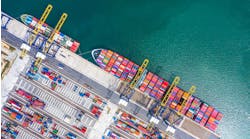We've all had the experience of passing a disabled car along the road and said, "I'm sure someone has already called it in." I had that opening in mind for this column when, on my way to the airport, I passed a car on fire along the freeway. As expected, the 911 dispatcher replied that it had already been reported.
Arriving at the State of Logistics Report in Washington, D.C. I watched Roz Wilson take the podium at the Ronald Reagan Building and begin speaking. Instead of applause, she was greeted with alarms, and we were ordered to evacuate the building. When we returned to the meeting room, Roz paused in her presentation, where she had previously described the "explosive growth" in logistics costs, she now decided to substitute another phrase.
Roz talked about the resilience of logistics systems that can respond to dramatic changes. She referred to the vast array of professionals around the globe who react with quick, decisive and appropriate action. That description brought my thoughts back to an announcement by DHL in June that it had established a Disaster Response Team in Southern Florida to serve Latin America and the Southern U.S.
In today's logistics, extended supply chains are vulnerable to disruptions resulting from natural or man-made disasters almost anywhere in the world. Fast, appropriate action protects those supply chains. But our stake in the outcome of those disasters has at least two dimensions — one economic and the other humanitarian.
When we react to a typhoon that has disrupted shipping in the South China Sea and redirect shipments or shift sourcing, we protect our economic stake. When we lend our knowledge, expertise and resources to providing aid to those directly affected by the same natural disaster that challenged our supply chain, we serve the humanitarian need.
More companies are stepping up and providing resources for the humanitarian efforts, and the logistics community can contribute directly by helping to establish the temporary supply chains that will bring comfort to those in need. The International Committee of the Red Cross (www.icrc.org) and Corporations for Humanity (www.fritzinstitute.org/ corpsforhumanity.htm) come to mind as starting points. Nearly any of the relief or humanitarian organizations, local or global, can benefit from the loan of some logistics talent.
Involvement is crucial — on an individual level, from a company level and by an organized global body. As Roz Wilson's comments point out, we already know how to do this. The fact her statement was interrupted by an evacuation demonstrates that disruptions can occur anywhere at any time, even on a relatively small scale. And, remembering that car fire, you can't assume someone else has already taken care of the problem . . . and that's what I started out to say before all of this other stuff happened.


